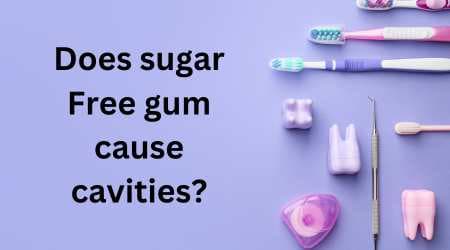
Sugar-free gum does not directly cause cavities, but it can indirectly contribute to their development. When you chew gum, it increases the production of saliva, which helps to neutralize harmful acids and wash away food particles.
However, some sugar-free gums contain acidic flavorings or artificial sweeteners that can erode tooth enamel over time, making teeth more susceptible to decay. Additionally, chewing gum can cause dental work such as fillings and orthodontic appliances to become dislodged or damaged.
Therefore, it is important to choose sugar-free gum responsibly and practice good oral hygiene habits to maintain healthy teeth and gums.
Benefits Of Sugar-Free Gum
Does Sugar-Free Gum Cause Cavities? Benefits Of Sugar-Free Gum
Chewing gum is a habit many people do to freshen their breath or suppress hunger. Some people even believe that gum-chewing helps to prevent cavities. However, is this true? Does sugar-free gum pose a risk to our oral health?
Increased Production Of Saliva
One of the most advantageous benefits of sugar-free gum is that it stimulates the production of saliva. Here’s how:
- Saliva helps to neutralize the acids produced by bacteria in our mouths, which protects us from tooth decay.
- It washes away food particles and debris, preventing plaque formation.
- Saliva production increases when we chew sugar-free gum, which helps to reduce dry mouth sensation.
Enamel Remineralization
Sugar-free gum also helps to remineralize tooth enamel. Here's what you should know:
- Tooth enamel is damaged by acids produced by bacteria in our mouths.
- When we chew gum, it stimulates saliva production, which neutralizes these acids and helps to remineralize and strengthen the enamel.
- Xylitol, an ingredient found in many sugar-free gum brands, can also further promote remineralization.
Decreased Bacteria
Sugar-free gum can play a crucial role in reducing the amount of bacteria in our mouths. Here's why:
- Action of chewing sugar-free gum helps to dislodge and remove bacteria from our teeth and gums.
- Increased saliva flow from chewing gum also helps to flush bacteria away.
- The ingredient, xylitol, also contributes to the reduction of harmful bacteria by preventing them from adhering to our teeth and gums.
Sugar-free gum has many benefits that outweigh the potential risks of tooth decay it poses. With increased saliva production, enamel remineralization, and decreased bacteria in our mouths, sugar-free gum can actually promote oral health. So the next time you want to freshen your breath or snack, grab a pack of sugar-free gum and chew away!
Read also: Can I Chew Sugar Free Gum With Braces?
Risks Of Sugar-Free Gum
Chewing gum is a popular activity enjoyed by many people. Whether you're trying to freshen your breath or reduce stress, gum seems to offer benefits that are hard to resist. However, while sugar-free gum is often touted as a healthy alternative to its sugar-laden counterpart, it does come with some risks.
Here are some of the potential risks to be aware of:
Excessive Chewing And Jaw Pain
Chewing gum can lead to excessive wear and tear on the jaw joint if done excessively. The jaw joint, also known as the temporomandibular joint, can become inflamed and painful, a condition known as temporomandibular joint disorder. Symptoms of this disorder may include pain when opening your mouth, clicking or popping sounds, and difficulty chewing.
Overuse of sugar-free gum can worsen these issues, especially if you have a preexisting condition.
- Excessive chewing of sugar-free gum can lead to jaw pain and inflammation.
- Temporomandibular joint disorder may cause clicking or popping sounds and difficulty chewing.
Flavored Gum And The Potential For Dental Erosion
Many sugar-free gums come in a wide variety of flavors, some of which can be highly acidic. Sour flavors, in particular, can erode your enamel over time, leading to dental erosion. This process can cause cavities, sensitivity to hot and cold foods, and even tooth loss in severe cases.
While sugar-free gum is less harmful than sugar-sweetened gum in terms of dental caries, choose your gum flavor carefully, and avoid overly acidic choices.
- Flavored sugar-free gum, particularly sour options, can erode tooth enamel and cause dental erosion.
- Dental erosion can lead to cavities, tooth sensitivity, and even tooth loss.
Role Of Artificial Sweeteners
Sugar-free gum contains artificial sweeteners instead of sugar. These sweeteners are often used to provide a sweet taste without the calories that come with sugar. However, some studies have linked artificial sweeteners to a range of health problems, from headaches and mood changes to more serious issues like cancer and neurological diseases.
- Sugar-free gum contains artificial sweeteners, which are meant to provide a sweet taste without the calories of sugar.
- Artificial sweeteners have been linked to a range of health problems, from mild to severe, including cancer and neurological diseases.
By understanding the risks associated with sugar-free gum, you can make informed decisions about your oral health. While sugar-free gum is a great alternative to sugary options, moderation is key, and it's essential to choose flavors carefully to avoid dental erosion.
Sugar-Free Gum Vs. Regular Gum
Chewing gum is a common habit that many people enjoy. With numerous brands of gum available in the market, there are often concerns regarding their impact on oral health. One such concern is whether sugar-free gum causes cavities. In this post, we will explore the differences between sugar-free gum and regular gum, their ingredients, and how to consume them without compromising on oral health.
Impact Of Sugar On Oral Health
Sugar is one of the primary culprits responsible for cavities and tooth decay. When you consume sugary snacks or drinks, the bacteria in your mouth convert them into acid, which eats away the tooth enamel. Over time, this process can lead to cavities and even tooth loss.
Therefore, it is essential to choose gum that is free from sugar to avoid dental issues.
Comparative Ingredients And Health Benefits
Sugar-free gum is often sweetened with artificial sweeteners rather than sugar. As a result, it has minimal impact on oral health. On the other hand, regular gum contains sugar, which can increase the risk of cavities and tooth decay.
Apart from avoiding sugar, sugar-free gum offers several health benefits. It can help to:
- Stimulate saliva production, which can neutralize harmful acids and increase your mouth's natural cleaning mechanisms.
- Freshen your breath by eliminating unwanted odors.
- Reduce stress and anxiety by providing a physical action to focus on.
Argument For Moderation In Gum Consumption
While sugar-free gum has several health benefits, excessive consumption can still cause issues. For instance:
- Chewing gum can cause jaw muscle fatigue and lead to problems like tmj.
- Some artificial sweeteners used in sugar-free gum can cause digestive issues in some people.
Therefore, it is important to moderate your gum consumption. As a general guideline, you should restrict yourself to chewing gum for about 20 minutes at a time, not more than three times per day.
The choice between sugar-free gum and regular gum can significantly impact oral health. Always make sure to select sugar-free gum to avoid cavities and tooth decay. However, be mindful of your consumption and choose gum with artificial sweeteners that do not cause adverse health effects.
Choosing The Right Sugar-Free Gum
We all know that eating sugary foods can lead to tooth decay and cavities. That's why sugar-free gum is an excellent alternative that provides a tasty experience without the added sugar. But, are all sugar-free gums good for our teeth?
In this blog post section, we will discuss how to choose the right sugar-free gum to prevent cavities and keep your teeth healthy.
Brands With Ada (American Dental Association) Seal Of Acceptance
When choosing sugar-free gum, it's crucial to look for the ada (american dental association) seal of acceptance logo on the package. This is a significant indicator that the product is suitable for oral health. Here are some of the benefits of choosing the right gum that carries the ada seal:
- Gum has been thoroughly tested and proven to be effective against cavities.
- Ada evaluates the gum's ingredients and quality standards to ensure safety and efficacy for consumers.
- Manufacturers cannot buy the ada's seal of approval. Products are only awarded the seal after undergoing a rigorous examination process.
Recommendations For Gum With Xylitol
Xylitol is a natural sugar alcohol that has gained popularity as an ingredient in sugar-free gum. It has been shown to promote oral health in various ways, such as preventing cavities and reducing plaque buildup. Here are some recommendations for sugar-free gum with xylitol:
- Look for gum that has xylitol listed as one of the first ingredients.
- Aim to chew gum with xylitol after every meal and snack to help neutralize the acids on your teeth and promote healthy saliva production.
- Be cautious of consuming too much xylitol, which can lead to an upset stomach, gas, diarrhea, and bloating. Follow the recommended dosage on the package.
Identifying Individual Needs And Preferences
Choosing the right sugar-free gum requires identifying individual needs and preferences. Here are some factors to consider:
- Flavor preferences: Look for gum with flavors that you enjoy and can commit to chewing regularly.
- Chewing resistance: Some individuals prefer gum with a firm texture, while others may prefer it softer.
- Teeth sensitivity: Individuals with sensitive teeth may need to avoid gum with hard or sharp particles that can cause discomfort.
- Health concerns and medication interactions: Check with your dental professional if you have specific health concerns or are taking medications that could interfere with your oral health.
Choosing the right sugar-free gum can lead to improved oral health and prevent cavities. With these factors in mind, always look for the ada seal of acceptance logo, consider gum with xylitol, and identify individual needs and preferences when selecting a sugar-free gum.
Happy chewing!
Frequently Asked Questions Of Does Sugar Free Gum Cause Cavities
Does Chewing Sugar-Free Gum Cause Cavities?
No, chewing sugar-free gum does not cause cavities. In fact, some sugar-free gums promote oral health by increasing saliva production, which helps neutralize acid and prevent tooth decay.
Can Sugar-Free Gum Help Prevent Cavities?
Yes, sugar-free gum can help prevent cavities. Chewing sugar-free gum increases saliva production which helps to wash away food particles and neutralize acid in the mouth. This reduces the risk of tooth decay and cavities.
How Often Should I Chew Sugar-Free Gum?
It's recommended to chew sugar-free gum for 20 minutes after a meal, three times a day. Over-chewing or extended use can lead to jaw pain and other dental issues, so make sure to limit your gum chewing time and frequency.
Is All Sugar-Free Gum Safe For Teeth?
Not all sugar-free gum is safe for teeth. Look for gum that has the american dental association (ada) seal of approval, which means it has met strict guidelines for safety and effectiveness in preventing tooth decay and cavities.
What Are The Other Benefits Of Chewing Sugar-Free Gum?
Chewing sugar-free gum not only helps prevent cavities, but it can also freshen breath, reduce stress, and improve digestion. Additionally, some studies have shown that gum chewing may improve brain function and memory retention.
Conclusion
Based on the research we’ve discussed, sugar-free gum can be a great alternative to sugary treats when it comes to maintaining oral health. While it may not be a direct cause of cavities, it’s important to keep in mind that sugar alcohols, which are commonly found in sugar-free gum, can lead to digestive issues if consumed in excessive amounts.
As with any food or beverage, moderation is key. Additionally, it’s important to maintain a thorough oral hygiene routine, including brushing, flossing, and regular dental check-ups. By doing so, you can enjoy the benefits of chewing gum without the potential negative effects on your teeth.
So next time you’re craving something sweet, consider reaching for a stick of sugar-free gum instead of a sugary snack. Your teeth (and waistline) will thank you!
